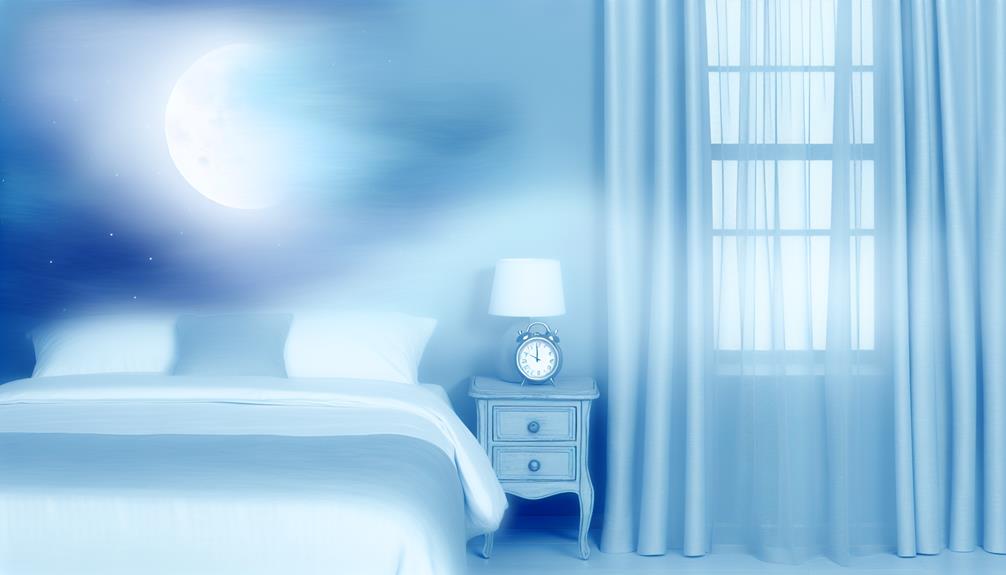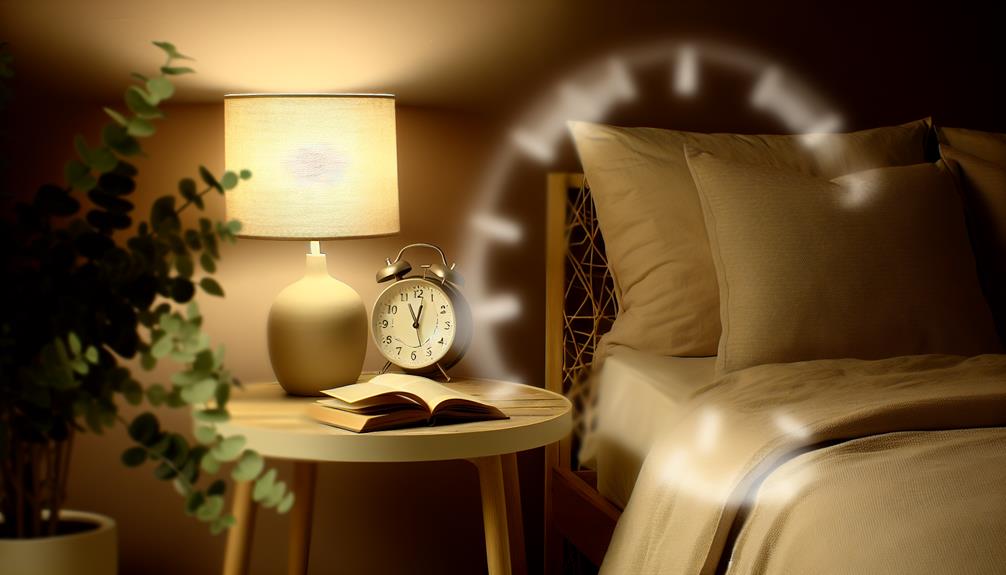To improve sleep and bolster hormonal health, I've learned it's essential to create a sleep-friendly environment and establish a consistent schedule. Dimming lights and avoiding screens before bed help enhance melatonin production. Aim for a cool room and consider blackout curtains to keep unwanted light out. Sticking to a regular sleep pattern while managing stress through mindfulness can also work wonders. I've noticed that incorporating balanced nutrition and exercise, especially high-intensity workouts, supports my energy levels too. There's so much more to explore on this journey, and I can't wait to share what I've uncovered with you.
Understand Sleep and Hormones

Understanding the intricate relationship between sleep and hormones is fundamental for maintaining overall health. I've come to realize that our body's hormonal balance is heavily influenced by our sleep patterns. When I look at my own life, it's clear that inconsistent sleep can throw off my circadian rhythms, leading to a cascade of hormonal disruptions.
Circadian rhythms, those natural cycles that regulate our sleep-wake patterns, play an important role in hormone production. For instance, melatonin, often dubbed the "sleep hormone," is produced in response to darkness, signaling my body that it's time to rest. If I ignore my body's cues and stay up late, it's not just my sleep that suffers; my melatonin levels drop, which can interfere with testosterone production and other essential hormones.
Moreover, inadequate sleep can elevate cortisol, the stress hormone, which can further exacerbate hormonal imbalances. I've noticed that when I'm sleep-deprived, I feel more anxious, which only compounds the issue. Research supports this connection; studies indicate that men experiencing sleep deprivation often show reduced testosterone levels, which can impact mood, energy, and even muscle mass.
To improve my hormonal health, I've learned that prioritizing sleep is non-negotiable. By establishing a consistent sleep schedule and respecting my circadian rhythms, I'm paving the way for a healthier hormonal balance. It's a simple yet powerful change that can positively affect my overall well-being.
Create a Sleep-Friendly Environment
Creating a sleep-friendly environment is essential for achieving quality rest and, ultimately, better hormonal health. I've found that making a few simple adjustments can dramatically improve my sleep quality and overall well-being. One of the first steps I took was to focus on lighting adjustments. As evening approaches, I dim the lights in my home to signal to my body that it's time to wind down. Blue light from screens can interfere with melatonin production, so I've switched to using blue light-blocking glasses and reduced screen time at least an hour before bed.
Another vital factor is bedroom temperature. I've discovered that a cooler room, ideally between 60 to 67 degrees Fahrenheit, promotes better sleep. If the temperature is too warm, I often struggle to fall asleep or stay asleep, which disrupts my hormonal balance. Investing in breathable bedding and wearing lighter pajamas has made a noticeable difference.
Additionally, I've minimized noise and clutter in my bedroom. A calm, organized space helps me relax and prepares me for sleep. To further enhance my environment, I've also incorporated blackout curtains to keep out any disruptive light from street lamps or early morning sun.
Establish a Consistent Sleep Schedule

A consistent sleep schedule is one of the most effective ways to enhance hormonal health and improve overall well-being. I've found that maintaining a regular bedtime routine helps my body know when it's time to wind down. When I stick to a consistent sleep duration, I notice significant improvements in my mood, energy levels, and hormonal balance.
Here's a simple table to illustrate the impact of a consistent sleep schedule:
| Day | Bedtime | Wake Time | Total Sleep Duration |
|---|---|---|---|
| Monday | 10:30 PM | 6:30 AM | 8 hours |
| Tuesday | 10:30 PM | 6:30 AM | 8 hours |
| Wednesday | 10:30 PM | 6:30 AM | 8 hours |
| Thursday | 10:30 PM | 6:30 AM | 8 hours |
| Friday | 11:00 PM | 7:00 AM | 8 hours |
As you can see, sticking to a similar bedtime and wake time gives me a solid framework. While some flexibility is okay on weekends, I try not to stray too far from my routine. This consistency boosts my sleep quality and guarantees I wake up feeling refreshed.
Incorporating a relaxing bedtime routine, like reading or meditating, signals to my body that it's time to sleep. So, if you're looking to improve your hormonal health, consider establishing a consistent sleep schedule. It's been a game-changer for me!
Manage Stress Effectively
Stress management is crucial for maintaining hormonal health, as elevated stress levels can disrupt the delicate balance of hormones in the body. I've found that effectively managing stress not only improves my mental well-being but also enhances my sleep quality and overall hormonal balance.
One powerful tool I've incorporated into my routine is mindfulness techniques. Mindfulness helps me stay present, reducing anxiety and preventing my mind from racing. Simple practices like focused breathing or body scans can be done in just a few minutes each day. I often set aside time for meditation, which allows me to tune into my thoughts and feelings, helping me cultivate a sense of calm.
In addition to mindfulness, I've also embraced relaxation exercises. I've discovered that progressive muscle relaxation works wonders for winding down after a hectic day. By systematically tensing and then relaxing different muscle groups, I release built-up tension and prepare my body for a good night's sleep.
I encourage you to explore these strategies for yourself. Finding what resonates with you is key; whether it's taking a walk in nature or practicing yoga, integrating these techniques into your daily life can meaningfully reduce stress. Remember, reducing stress is not just about feeling good in the moment; it's about creating a sustainable environment for hormonal health. By managing stress effectively, I'm not only benefiting my sleep but also supporting my overall health and well-being.
Optimize Nutrition and Exercise

Effective stress management has laid a solid foundation for my overall well-being, but I've found that optimizing nutrition and exercise plays an equally significant role in supporting hormonal health. It's fascinating how what I eat and how I move impacts my hormones, especially testosterone and cortisol, which are essential for sleep quality.
When it comes to meal timing, I've learned that eating my larger meals earlier in the day helps regulate my circadian rhythms. A balanced breakfast sets the tone for my metabolism, while a lighter dinner minimizes insulin spikes before bed, promoting better sleep. I aim for a combination of protein, healthy fats, and complex carbohydrates, ensuring I'm fueling my body with the right nutrients.
Workout intensity also matters. I've discovered that engaging in high-intensity interval training (HIIT) can boost testosterone levels, which is critical for muscle maintenance and overall vitality. However, I've also found that moderation is key; over-training can lead to increased cortisol, which disrupts sleep. As a result, I balance intense workouts with lower-intensity activities, like yoga or walking, to help keep my hormone levels stable.
Incorporating these nutritional strategies and exercise routines has not only improved my energy levels but also enhanced my sleep quality. By focusing on meal timing and workout intensity, I'm actively supporting my hormonal health, paving the way for better sleep and overall well-being. If you haven't considered these factors yet, I encourage you to give them a try!
Frequently Asked Questions
Can Technology Use Before Bed Affect Hormonal Health?
I often wonder how technology affects our hormonal health. Research shows that blue light emitted from screens can disrupt our sleep patterns, leading to hormonal imbalances. I've noticed that excessive screen time before bed makes it harder for me to fall asleep. It's essential to limit screen exposure in the evening to promote better sleep quality. By doing so, I've found I feel more energized and balanced the next day.
What Role Does Caffeine Play in Sleep Quality?
Ah, caffeine—the magical elixir that turns us into productivity superheroes! But let's face it, the timing of caffeine consumption can seriously sabotage our sleep quality. If I sip that coffee too late, I'm practically inviting insomnia to my slumber party. Luckily, I've found some fantastic caffeine alternatives, like herbal teas, that help me wind down without sacrificing my energy during the day. Trust me, timing is everything when it comes to sleep!
How Does Sleep Apnea Impact Hormone Levels?
I've learned that sleep apnea can seriously impact hormone levels. When I don't get enough quality sleep, my testosterone levels drop, leading to a hormonal imbalance. Plus, sleep apnea can disrupt cortisol regulation, which further complicates things. These fluctuations not only affect my mood and energy but also pose significant health risks over time. It's essential to address sleep apnea to maintain balanced hormones and overall well-being.
Are There Specific Supplements for Better Sleep?
When it comes to better sleep, I've found that certain supplements can really help. Melatonin supplements are popular for regulating sleep cycles, while magnesium benefits include calming the mind and body. I've also tried valerian root, which is known for its relaxing properties. Herbal teas, like chamomile or lavender, can be soothing before bed too. Each of these options has its own merits, so experimenting might lead you to a better night's rest!
What Are the Effects of Napping on Sleep Cycles?
I've found that napping can greatly impact our sleep cycles. The duration and timing of a nap can influence sleep architecture and our circadian rhythm. Short naps, around 20-30 minutes, boost daytime alertness without disrupting nighttime sleep. However, longer naps might lead to grogginess and throw off hormonal balance. It's all about finding that sweet spot to recharge effectively while maintaining a healthy sleep routine throughout the day.
